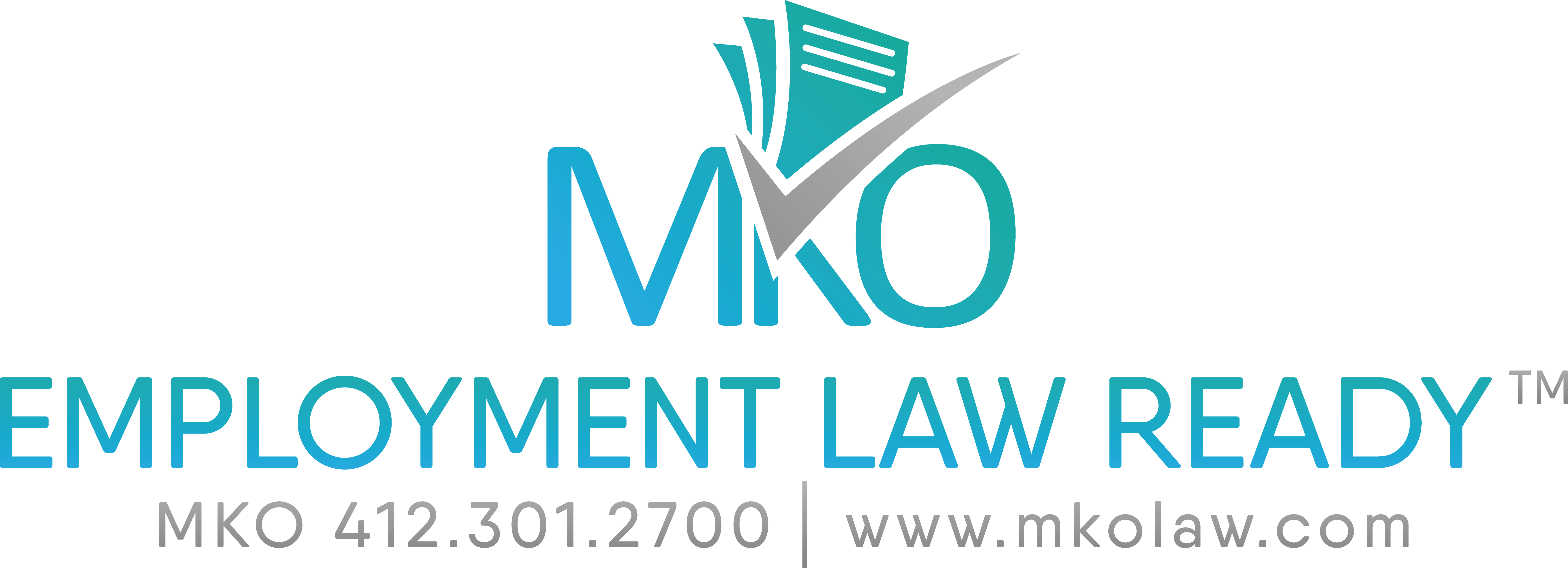Employment Discrimination for Transgender Employees in Pennsylvania
 At MKO Employment Law LLC, we understand that being a transgender employee in Pennsylvania can be challenging due to discrimination in the workplace. Every situation is unique but most individuals opt for an, “Exit Strategy for Transgender Employees.” This method emphasizes the importance of seeking a job separation in exchange for settlement compensation for the unfair treatment you have experienced. Employment discrimination against transgender employees is a multifaceted issue that can manifest in various ways. It is essential to have a comprehensive understanding of the types of discrimination transgender employees may face, the contributing factors, and the potential consequences. This knowledge will help you recognize and address discrimination in your workplace.
At MKO Employment Law LLC, we understand that being a transgender employee in Pennsylvania can be challenging due to discrimination in the workplace. Every situation is unique but most individuals opt for an, “Exit Strategy for Transgender Employees.” This method emphasizes the importance of seeking a job separation in exchange for settlement compensation for the unfair treatment you have experienced. Employment discrimination against transgender employees is a multifaceted issue that can manifest in various ways. It is essential to have a comprehensive understanding of the types of discrimination transgender employees may face, the contributing factors, and the potential consequences. This knowledge will help you recognize and address discrimination in your workplace.
Understanding Employment Discrimination Against Transgender Employees
1.1. Types of Discrimination
Transgender employees may encounter various forms of discrimination, including:
1.1.1. Hiring Discrimination
Transgender individuals may face discrimination during the hiring process. This can include being denied job opportunities based on their gender identity or expression, even if they are qualified for the position. Hiring discrimination can be subtle, such as employers making biased assumptions about transgender candidates or not providing them with equal consideration.
1.1.2. Promotion and Advancement Discrimination
Transgender employees may be overlooked for promotions or career advancement opportunities due to their gender identity. This can result from biased evaluations, discriminatory policies, or exclusion from networking opportunities essential for career growth.
1.1.3. Harassment and Hostile Work Environment
A hostile work environment can occur when transgender employees are subjected to persistent harassment, ridicule, or other demeaning behaviors based on their gender identity. This can include offensive comments, derogatory language, or inappropriate jokes. Harassment may also involve unwanted physical contact or invasion of personal space.
1.1.4. Wage and Benefit Discrimination
Transgender employees may experience discrimination in terms of wages and benefits. This can manifest as unequal pay for equal work or being denied access to benefits, such as health insurance coverage for gender-affirming treatments.
1.1.5. Retaliation
Retaliation can occur when an employer punishes a transgender employee for asserting their rights, reporting discrimination, or participating in a discrimination investigation. Retaliation can take various forms, including demotions, pay reductions, or unfavorable job assignments.
1.1.6. Failure to Accommodate
Employers may discriminate against transgender employees by failing to accommodate their gender transition-related needs. This can include refusing to update personnel records, denying access to appropriate restroom facilities, or not providing reasonable time off for medical appointments.
1.2. Contributing Factors
Several factors can contribute to employment discrimination against transgender employees, such as:
1.2.1. Lack of Awareness and Understanding
A lack of awareness and understanding about transgender issues can contribute to discrimination. Employers and coworkers may hold misconceptions or biases about transgender individuals, leading to unfair treatment.
1.2.2. Stereotyping and Bias
Stereotyping and bias can play a significant role in employment discrimination. Employers and coworkers may make assumptions about transgender employees’ abilities, work ethic, or interpersonal skills based on their gender identity, rather than evaluating them fairly and objectively.
1.2.3. Organizational Culture
Organizational culture can also contribute to discrimination against transgender employees. A workplace that does not prioritize diversity, inclusion, and equity may foster an environment where discrimination is more likely to occur.
1.3. Consequences of Discrimination
Discrimination can have severe consequences for transgender employees, such as:
1.3.1. Emotional and Psychological Impact
The emotional and psychological impact of discrimination can be significant, leading to stress, anxiety, depression, and other mental health issues.
1.3.2. Financial Consequences
Discrimination can lead to financial consequences, such as lost wages, missed career advancement opportunities, or job loss.
1.3.3. Damage to Professional Reputation
Experiencing discrimination can damage a transgender employee’s professional reputation, making it more challenging to secure future employment or advance in their career.
1.3.4. Loss of Job Satisfaction and Engagement
Discrimination can lead to a loss of job satisfaction and engagement, resulting in decreased productivity and motivation. This can also contribute to higher turnover rates as transgender employees seek more inclusive work environments.
1.3.5. Negative Impact on Workplace Culture
Discrimination against transgender employees not only affects the targeted individuals but can also create a negative workplace culture. This can lower morale, teamwork, and overall productivity among all employees.
1.4. Legal Protections for Transgender Employees
Transgender employees are protected from employment discrimination under both federal and Pennsylvania state laws. These legal protections include:
1.4.1. Title VII of the Civil Rights Act
Title VII of the Civil Rights Act prohibits employment discrimination based on sex. In recent years, courts and the Equal Employment Opportunity Commission (EEOC) have increasingly interpreted sex discrimination to include discrimination based on gender identity, including transgender status.
1.4.2. The Pennsylvania Human Relations Act
The Pennsylvania Human Relations Act (PHRA) prohibits employment discrimination based on sex, among other protected characteristics. While the PHRA does not explicitly mention gender identity, the Pennsylvania Human Relations Commission has clarified that discrimination based on gender identity is considered a form of sex discrimination under the Act.
1.4.3. Local Ordinances
Some local jurisdictions in Pennsylvania have enacted ordinances specifically prohibiting employment discrimination based on gender identity or expression. These local laws may offer additional protections for transgender employees.
1.5. Steps to Address Employment Discrimination
If you are a transgender employee experiencing employment discrimination, it is crucial to take action to protect your rights. Some steps you can take include:
- Document incidents of discrimination, including details about when, where, and who was involved.
- Report the discrimination to your employer or human resources department, following your company’s policies and procedures.
- Seek legal advice from an experienced employment attorney, such as MKO Employment Law LLC, to discuss your options and potential remedies, specifically an Exit Strategy is most common.
- File a complaint with the EEOC or the Pennsylvania Human Relations Commission, if necessary.
By understanding the various forms of employment discrimination against transgender employees, the contributing factors, and the potential consequences, you will be better equipped to recognize and address this discrimination in your workplace. Armed with this knowledge and the support of experienced legal professionals like MKO Employment Law LLC, you can seek justice and ensure your rights are protected.
The Importance of an Exit Strategy for Transgender Employees
Transgender employees who experience discrimination, harassment, or a hostile work environment may find it necessary to seek an exit strategy from their current employment situation. An exit strategy is a carefully planned approach to leaving a job while securing the best possible outcome for the employee, including financial compensation for the discrimination they faced. Here’s why it’s essential for transgender employees to consider an exit strategy and what it entails:
1. Preserving Mental and Emotional Well-being
Discrimination and harassment can take a significant toll on an individual’s mental and emotional well-being. Prolonged exposure to a hostile work environment can lead to heightened stress, anxiety, depression, and other mental health challenges. Seeking an exit strategy allows transgender employees to prioritize their well-being by removing themselves from a toxic workplace.
2. Protecting Professional Reputation and Career Growth
Discrimination can hinder career growth and damage an employee’s professional reputation. By seeking an exit strategy, transgender employees can protect their career trajectory and ensure they have the opportunity to advance in a more supportive and inclusive work environment.
3. Holding Employers Accountable
An exit strategy often involves negotiating a settlement with the employer, which can hold them accountable for the discrimination that occurred. This not only compensates the employee for their suffering but also sends a message that such behavior is unacceptable and can have severe consequences for the employer.
4. Financial Compensation
An exit strategy can involve negotiating a severance package or a settlement that provides financial compensation for the discrimination experienced. This compensation can help transgender employees support themselves as they search for new employment or cover expenses related to their transition or mental health support.
5. Legal Protection
An exit strategy often includes securing legal representation from an experienced employment attorney. This ensures that the transgender employee’s rights are protected throughout the process and that they have the best possible chance of securing a favorable outcome.
What an Exit Strategy Entails
With the guidance and representation of their attorney, the employee enters into negotiations with their employer to reach a mutually agreeable settlement. This may include financial compensation, a severance package, or other terms that address the employee’s needs and concerns. Exiting the Workplace: Once an agreement has been reached, the employee leaves their job, ideally with their professional reputation intact and financial support to help them transition to a new employment opportunity.
In conclusion, seeking an exit strategy is crucial for transgender employees facing workplace discrimination as it allows them to prioritize their mental and emotional well-being, protect their professional reputation, hold employers accountable, and secure financial compensation. By partnering with experienced employment attorneys like those at MKO Employment Law LLC, transgender employees can successfully navigate this challenging process and work towards a better future.
Attorney Email
Using the Unemployment Hearing to Sue Your Employer:
The unemployment hearing is a legal process where employees who have been terminated from their job can apply for unemployment compensation benefits. The employee presents evidence to demonstrate their eligibility for benefits, including information about their employment history and the reason for their separation from employment. The hearing provides an opportunity to present evidence and argue a case if eligibility is in question, and testimony from a former employer may be involved.
30 Tips and Ways and Considerations When Using the Unemployment Hearing to Sue Your Employer:
- Provides a Free Discovery Process: The unemployment hearing provides a free and low-risk discovery process that can be used to gather evidence and information to support a civil lawsuit against your employer.
- Demonstrates Eligibility for Unemployment Benefits: Using the unemployment hearing to sue your employer requires demonstrating your eligibility for unemployment benefits, which can be used as evidence in a civil lawsuit.
- Allows for Testimony and Evidence: The unemployment hearing allows for testimony and evidence to be presented, which can be used to support your case in a civil lawsuit.
- Demonstrates Employer’s Illegal Conduct: The unemployment hearing can be used to demonstrate your employer’s illegal conduct, including workplace discrimination, harassment, retaliation, or other forms of illegal conduct.
- Provides a Forum for Legal Argument: The unemployment hearing provides a forum for legal argument, allowing you to make a persuasive and compelling case against your employer.
- Can Lead to a Favorable Ruling: A favorable ruling in the unemployment hearing can provide important leverage in a civil lawsuit and increase the likelihood of a successful outcome.
- Minimizes Risk and Cost: The unemployment hearing is a low-risk and cost-effective way to gather evidence and information to support a civil lawsuit.
- Demonstrates Your Willingness to Fight for Justice: Pursuing legal action against your employer demonstrates your willingness to fight for justice and hold them accountable for their illegal conduct.
- Provides Closure and Compensation: A successful civil lawsuit can provide closure and compensation for the harm and injustice you suffered at the hands of your employer.
- Sends a Message to Other Employers: Pursuing legal action against your employer sends a message to other employers that illegal conduct will not be tolerated and that employees have legal options to seek justice and compensation.
- Check your state’s unemployment compensation rules: Each state has its own rules for unemployment compensation, so make sure you understand the specific requirements in your state.
- Determine if you are eligible for unemployment benefits: Before pursuing an appeal, make sure you are eligible for unemployment benefits, as this will be an important factor in your legal case.
- Be aware of time limits: There are often strict time limits for filing an unemployment appeal, so make sure you understand the deadline and act promptly.
- Understand the appeal process: The appeal process can be complex, so make sure you understand the steps involved and what to expect.
- Review your personnel file: Your personnel file may contain important information relevant to your case, so review it carefully and make sure your lawyer has access to it.
- Understand the role of witnesses: Witnesses can be valuable in establishing your case, so identify potential witnesses and discuss their role with your lawyer.
- Prepare for cross-examination: Your former employer’s lawyer may cross-examine you or your witnesses, so make sure you are prepared for this.
- Consider the potential for settlement: Settlements can be a way to resolve legal disputes without going to trial, so consider whether this may be an option in your case.
- Review your social media accounts: Social media activity can sometimes be used as evidence in legal cases, so review your accounts and make sure there is no damaging information.
- Understand the potential impact on your future employment: Pursuing legal action against an employer can impact future job prospects, so weigh this carefully before proceeding.
- Be prepared for emotional challenges: Pursuing legal action can be emotionally challenging, so be prepared for the potential stress and anxiety.
- Consider the potential impact on your personal life: Legal action can be time-consuming and costly, so make sure you are prepared for the potential impact on your personal life.
- Understand the potential for counterclaims: Your former employer may file a counterclaim against you, so be prepared for this possibility.
- Consider the impact on your former co-workers: Legal action can impact your former co-workers, so consider the potential consequences for them.
- Prepare for a potential trial: While rare, if your case goes to trial, be prepared for the potential challenges of presenting your case in court.
- Understand the potential for appeals: If the decision does not go in your favor, there may be the potential for further appeals, so be prepared for this possibility.
- Be prepared for media attention: Legal cases can sometimes attract media attention, so be prepared for this possibility.
- Consider the potential for arbitration or mediation: Arbitration or mediation can sometimes be a less costly and less time-consuming way to resolve legal disputes, so consider whether this may be an option in your case.
- Understand the potential for confidentiality breaches: Legal cases can sometimes result in confidential information being made public, so be prepared for this possibility.
- Evaluate your goals: Before pursuing legal action, evaluate your goals and make sure they are realistic and achievable, given the potential costs and risks involved.
📲412-301-2700
“Providing you a path forward in your life, career, and recovering the compensation you deserve.™”
 MKO is a “boutique firm” which means that we focus on a niche area and offer highly specialized services to clients who are looking for the personal touch within our area of expertise: Employment Law. Boutique law firms are not a general practice or one-stop legal shop, and that’s a good thing. You need one good attorney who knows the ins and outs of the area of law that’s relevant to your case. Look for a law firm that primarily practices the area of law that you need. If that’s all they do, chances are, they do it very well. We see each legal dispute as an opportunity to find a fair and equitable resolution without destroying your reputation, resume, job prospects, income, and if avoidable, not subjecting you, your family, friends, and former coworkers to unnecessary, highly invasive, time consuming, stressful, and ultimately public litigation. MKO, “Providing you a path forward in your life, career, and recovering the compensation you deserve.™” Confidentiality is key, for everyone. Are you a victim? MKO’s employment lawyers are always available for the clients. You can contact us anytime for a case assessment and evaluation.
MKO is a “boutique firm” which means that we focus on a niche area and offer highly specialized services to clients who are looking for the personal touch within our area of expertise: Employment Law. Boutique law firms are not a general practice or one-stop legal shop, and that’s a good thing. You need one good attorney who knows the ins and outs of the area of law that’s relevant to your case. Look for a law firm that primarily practices the area of law that you need. If that’s all they do, chances are, they do it very well. We see each legal dispute as an opportunity to find a fair and equitable resolution without destroying your reputation, resume, job prospects, income, and if avoidable, not subjecting you, your family, friends, and former coworkers to unnecessary, highly invasive, time consuming, stressful, and ultimately public litigation. MKO, “Providing you a path forward in your life, career, and recovering the compensation you deserve.™” Confidentiality is key, for everyone. Are you a victim? MKO’s employment lawyers are always available for the clients. You can contact us anytime for a case assessment and evaluation.
Ten Reasons You Want MKO As Your Employment Counsel
1. Focused Employment Law Practice
MKO is a “boutique law firm” which means that we concentrate on this niche area and offer highly focused employment law services to clients who are looking for the personal touch. Boutique law firms are not a one-stop legal shop, and that’s a good thing. While a long roster of diverse legal services may look impressive on paper, it’s fairly pointless in practice. You need one good attorney who knows the ins and outs of the area of law that’s relevant to your case. Look for a law firm that only practices in the area of law that you need. If that’s all they do, chances are, they do it very well.
2. Technology Driven & Experts in the Cloud
We provide immediate legal consultations, operate a paperless law firm, use advanced cloud storage, digital signatures, electronic forms, and can review your documents using screen share technology instantaneously. MKO is technologically savvy, nimble, flexible, and efficient.
We are not confined to our office, chained to a desktop computer, or burdened with IT maintenance. Thanks to the smart use of technology we can focus on providing our clients with the best representation possible. By streamlining our practice we can focus on what our clients hire us to do – advocate on their behalf and work diligently toward a desired result.
3. Legal Advice Instantly From The Comfort of Home
MKO can provide superior legal services through adaptive use of new technology and provide the majority of legal assistance while you are comfortably working from your home. It just also happens it's better, easier, and faster for our clients - they really appreciate it. We seamlessly and interactively collaborate with you in a relaxed environment where you have all of your files in your immediate control. We find this is the absolute best way to provide legal advice to our clients on complex legal issues, hands down.
The old style of coming into our office with binders of disjointed and unsearchable paperwork, of which we to organize and figure out on the fly, is incredibly wasteful, time-consuming, inefficient, and not highly productive. Because of our integration with technology, we are ready to work with you on highly intricate matters on a moments notice, no matter where you (or we) are.
4. Discreet When Necessary
While many cases require that we go to court to seek justice, there are a substantial number of disputes that need to be handled discreetly. We see each legal dispute as an opportunity to find a fair and equitable resolution without destroying your reputation, resume, job prospects, income, and if avoidable, not subjecting you, your family, friends, and former coworkers to unnecessary, highly invasive, time consuming, stressful, and ultimately public litigation. MKO, “Providing you a path forward in your life, career, and recovering the compensation you deserve.™”
Confidentiality is key, for everyone.
5. Experience, Professional, & Integrity
Through representing and managing thousands of employment situations, rest assured there is help or a path forward for your situation. For example, Partner Christi Wallace has personally represented over 1000 clients and has managed hundreds more for associates that worked for her in just her first 10 years!
6. Highly Responsive Attorneys
We always get the question, "If I choose to have you represent me, will it be difficult for me to get in touch with you?"
Absolutely not, we even make ourselves available to clients beyond our normal business hours! Further, when you call us your attorney answers, not a secretary who puts you on hold for 20 minutes, then tells you that you can leave a voicemail for your attorney. Besides the MKO office phone number, our clients can contact their attorney via mobile, SMS & texting, business email, and an urgent emergency email. For example, we can often respond to a text message in just a few minutes. Experience a better, faster, and more efficient way to work with an attorney. MKO believes that clients can and should depend on the fact that we’ll respond quickly.
7. Attorneys Available 74+ Hours Per Week
Employment Attorneys are available at least 74 hours per week by phone, email, and text messaging. Don't be fooled by marketing, many law firms are using non-attorney 3rd party answering services and advertising "Phones Answered 24 Hours A Day, 7 Days A Week." We pick up our own phones, respond to our own emails and text messages, and use real attorneys, 74+ hours per week.
M-F 7am-7pm
Sat/Sun 8am-3pm
8. Practical Advice From Seasoned Professionals
MKO strongly believes that every situation is distinctly unique and therefore we must endeavor to find the right solution for that particular issue. Because we are a boutique employment law firm, we strive to find unique and innovation solutions for our clients in every circumstance. We take action when necessary, put together deals when possible, and work with our clients so we can be creative and find smart solutions instead of needless litigation. We want to protect your interests now and in the future.
9. Contingency Representation
Contingency Legal Representation is where you do not have to pay your lawyer up front. This is fantastic if you are offered this option. Lawyers and litigation costs are incredibly expensive if you pay hourly. With contingency representation, you are not faced with large legal bills and expenses that are daunting and causes slow downs while waiting for a retainer to be replenished. Further, when you're offering to pay anyone up front and hourly, it seems they'll take almost any case - so long as they are getting paid. Funny how that works. Here's how we help:
- People can afford an attorney. – Without the benefit of contingency, it would be very difficult for a person who was recently separated from their job to afford an employment lawyer.
- MKO only gets paid if there is a recovery. – We put our money where our mouth is, if we don't get a recovery, you don't owe legal fees and costs.
- Contingency representation says something about your case. – Considering MKO only will get paid if there is a recovery, you can assume we like to cases that we believe have merit.
- Helps people can move on with their lives – Instead of racking up debt to pay for legal help, our contingency representation lets you move on with your life as we deal with the legal stuff. This is exactly what MKO stands for, “Providing you a path forward in your life, career, and recovering the compensation you deserve.™"
10. Keeping Costs Low To Focus On Your Case
Our clients understand that their representation is are far more important than an expensive address. Some law firms might be battling an extremely burdensome and large cost overhead. In other words, to survive, they may need to be a "factory firm" or "volume practice" that needs to process a vast amount of cases to be able to afford their superfluous costs, expenses, and overhead. We aggressively keep costs down so we can focus on you.
Don't want to be treated like an account number, a settlement figure, or a wheel that needs to be turned to keep the law firm getting paid? We keep our costs low and use this financial freedom for our clients best interests.
Legal Consultations
Hours Open Every Week
Clients & Cases Managed
Wrongful Termination
We help people fired, or soon to be fired, when they have been treated unfairly, illegally, or unjustly.
Employment Discrimination
Race, religion, gender (including pregnancy, childbirth, and related medical conditions), orientation, disability.
Professional Exit Strategies
Remove yourself from a toxic workplace or help with a job loss. Lawyers give you an exit strategy.
Medical Accommodations
Employees needing physical or mental health/wellness accommodations are protected.
Disability Discrimination
Many health conditions can be considered disabilities and are legally protected including retaliation.
EEOC or PHRC Agencies
Aggressive lawyering in the state and federal agencies can mean quick, quiet, and lucrative resolutions.
Age Discrimination
For those over 40 years old (but older is preferred) that experience bias based on your age.
Sexual Harassment
A range of actions from mild transgressions to sexual abuse or sexual assault. A highly serious offense.
I trusted Mr. Kraemer with a rather difficult period of time for my family, and we came out on top. He is trustworthy and honest, incredibly helpful, and understanding. Five stars aren’t enough! Him and his staff are well experienced, and won’t let up until the truth is known and justice is served. Michael, it’s been a pleasure. I hope I never need your services again! If I do, I will not hesitate to give you a call.
%
Halfway to legal help. If you don't get paid, neither do we. All you need to do is call MKO!
Employment Law Ready✔ ™
Michael Kraemer was the only lawyer who took my case and would be the only lawyer I’d rely on. He kept me informed and was very intellectual on the whole subject that my case was revolved around. I give Mr. Kraemer a 10 out of 10 and I would refer him and his associates to anyone who wants a well defined lawyer.
Wrongful Termination & Discrimination Questions
To Ask During Your Free Lawyer Consultation
-
=What does an employment discrimination, wrongful termination lawyer do?
-
=Do I need an employment lawyer, what options do I have?
-
=Can a employment attorney really help my case, even if I still work there?
-
=When should I hire an employment law firm?
-
=Is discrimination, illegal conduct, and severance negotiations that common?
-
=How do you retain an employment attorney and is it really this easy?
-
=How do I know when I need an employment lawyer?
-
=When should I address discrimination at the office?
-
=What is my case worth?
-
=Do I have a retaliation, wrongful termination, or discrimination case?



















